- Home
- Samuel Beckett
Mercier and Camier Page 2
Mercier and Camier Read online
Page 2
Conclude nothing from those idle words, Mercier and Camier were old young.
It’s an idea, said Camier.
Will you look at that clatter of decorations, said Mercier. Do you realize the gallons of diarrhoea that represents?
Darkly, said Camier, as only one so costive can.
Let us suppose this alleged bicycle is ours, said Mercier. Where lies the harm?
A truce to dissembling, said Camier, it is ours.
Shift her out of here, said the ranger.
The day has dawned at last, said Camier, after years of shilly-shally, when we must go, we know not whither, perhaps never to return … alive. We are simply waiting for the day to lift, then full speed ahead. Try and understand.
What is more, said Mercier, we have still thought to take, before it is too late.
Thought to take? said Camier.
Those were my words, said Mercier.
I thought all thought was taken, said Camier, and all in order.
All is not, said Mercier.
Will you shift her or won’t you? said the ranger.
Are you venal, said Mercier, since you are deaf to reason?
Silence.
Can you be bought off? said Mercier.
Certainly, said the ranger.
Give him a bob, said Mercier. To think our first disbursement should be a sop to bribery and extortion.
The ranger vanished with a curse.
How of a piece they all are, said Mercier.
Now he’ll prowl around, said Camier.
What can that matter to us? said Mercier.
I don’t like being prowled around, said Camier.
Mercier took exception to this turn. Camier maintained it. This little game soon palled. It must have been near noon.
And now, said Mercier, the time is come for us.
For us? said Camier.
Precisely, said Mercier, for us, for serious matters.
What about a bite to eat? said Camier.
Thought first, said Mercier, then sustenance.
A long debate ensued, broken by long silences in which thought took place. At such times they would sink, now Mercier, now Camier, to such depths of meditation that the voice of one, resuming its drift, was powerless to bring the other back, or passed unheard. Or they would arrive simultaneously at often contrary conclusions and simultaneously begin to state them. Nor was it rare for one to lapse into a brood before the other had concluded his exposé. And there were times they would look long at each other, unable to utter a word, their minds two blanks. It was fresh from one such daze they decided to abandon their enquiry, for the time being. The afternoon was well advanced, the rain was falling still, the short winter day was drawing to a close.
It is you have the provisions, said Mercier.
On the contrary, said Camier.
True, said Mercier.
My hunger is gone, said Camier.
One must eat, said Mercier.
I see no point, said Camier.
We have a long hard road before us still, said Mercier.
The sooner we drop the better, said Camier.
True, said Mercier.
The ranger’s head appeared in the doorway. Believe it or not, only his head was to be seen. It was to say, in his quaint way, they were free to spend the night for half-a-crown.
Is thought now taken, said Camier, and all in order?
No, said Mercier.
Will all ever be? said Camier.
I believe so, said Mercier, yes, I believe, not firmly, no, but I believe, yes, the day is coming when all will be in order, at last.
That will be delightful, said Camier.
Let us hope so, said Mercier.
A long look passed between them. Camier said to himself, Even him I cannot see. A like thought agitated his vis-à-vis.
Two points seemed nevertheless established as a result of this consultation.
1. Mercier would set off alone, awheel, with the raincoat. Wherever he should stop for the night, at the first stage, he would get all in readiness to receive Camier. Camier would take the road as soon as the weather permitted. Camier would keep the umbrella. No mention of the sack.
2. It so chanced that Mercier, up to now, had shown himself the live wire, Camier the dead weight. The reverse was to be expected at any moment. On the less weak let the weaker always lean, for the course to follow. They might conceivably be valiant together. That would be the day. Or the great weakness might overtake them simultaneously. Let them in this case not give way to despair, but wait with confidence for the evil moment to pass. In spite of the vagueness of these expressions they understood each other, more or less.
Not knowing what to think, said Camier, I look away.
It would seem to be lifting, said Mercier.
The sun comes out at last, said Camier, that we may admire it sink, below the horizon.
That long moment of brightness, said Mercier, with its thousand colours, always stirs my heart.
The day of toil is ended, said Camier, a kind of ink rises in the east and floods the sky.
The bell rang, announcing closing time.
I sense vague shadowy shapes, said Camier, they come and go with muffled cries.
I too have the feeling, said Mercier, we have not gone unobserved since morning.
Are we by any chance alone now? said Camier.
I see no one, said Mercier.
Let us then go together, said Camier.
They left the shelter.
The sack, said Mercier.
The umbrella, said Camier.
The raincoat, said Mercier.
It I have, said Camier.
Is there nothing else? said Mercier.
I see nothing else, said Camier.
I’ll get them, said Mercier, you mind the bicycle.
It was a woman’s bicycle, without free wheel unfortunately. To brake one pedalled backwards.
The ranger, his bunch of keys in his hand, watched them recede. Mercier held the handlebar, Camier the saddle. The pedals rose and fell.
He cursed them on their way.
II
In the show windows the lights came on, went out, according to the show. Through the slippery streets the crowd pressed on as towards some unquestioned goal. A strange well-being, wroth and weary, filled the air. Close the eyes and not a voice is heard, only the onward panting of the feet. In this throng silence they advanced as best they could, at the edge of the sidewalk, Mercier in front, his hand on the handlebar, Camier behind, his hand on the saddle, and the bicycle slithered in the gutter by their side.
You hinder me more than you help me, said Mercier.
I’m not trying to help you, said Camier, I’m trying to help myself.
Then all is well, said Mercier.
I’m cold, said Camier.
It was indeed cold.
It is indeed cold, said Mercier.
Where do our feet think they’re taking us? said Camier.
They would seem to be heading for the canal, said Mercier.
Already? said Camier.
Perhaps we shall be tempted, said Mercier, to strike out along the towpath and follow it till boredom doth ensue. Before us, beckoning us on, without our having to lift our eyes, the dying tints we love so well.
Speak for yourself, said Camier.
The very water, said Mercier, will linger livid, which is not to be despised either. And then the whim, who knows, may take us to throw ourselves in.
The little bridges slip by, said Camier, ever fewer and farther between. We pore over the locks, trying to understand. From the barges made fast to the bank waft the watermen’s voices, bidding us good night. Their day is done, they smoke a last pipe before turning in.
Every man for himself, said Mercier, and God for one and all.
The town lies far behind, said Camier. Little by little night overtakes us, blueblack. We splash through puddles left by the rain. It is no longer possible to advance. Retreat is equally out
of the question.
He added, some moments later:
What are you musing on, Mercier?
On the horror of existence, confusedly, said Mercier.
What about a drink? said Camier.
I thought we had agreed to abstain, said Mercier, except in the event of accident, or indisposition. Does not that figure among our many conventions?
I don’t call drink, said Camier, a quick nip to put some life in us. They stopped at the first pub.
No bikes here, said the publican.
Perhaps after all he was a mere hireling.
And now? said Camier.
We might chain it to a lamppost, said Mercier.
That would give us more freedom, said Camier. He added, Of movement.
In the end they fell back on a railing. It came to the same.
And now? said Mercier.
Back to no bikes? said Camier.
Never! said Mercier.
Never say that, said Camier.
So they adjourned across the way.
Sitting at the bar they discoursed of this and that, brokenly, as was their custom. They spoke, fell silent, listened to each other, stopped listening, each as he fancied or as bidden from within. There were moments, minutes on end, when Camier lacked the strength to raise his glass to his mouth. Mercier was subject to the same failing. Then the less weak of the two gave the weaker to drink, inserting between his lips the rim of his glass. A press of sombre shaggy bulks hemmed them about, thicker and thicker as the hour wore on. From their conversation there emerged in spite of all, among other points, the following.
1. It would be useless, nay, madness, to venture any further for the moment.
2. They need only ask Helen to put them up for the night.
3. Nothing would prevent them from setting out on the morrow, hail, rain or shine, at the crack of dawn.
4. They had nothing to reproach themselves with.
5. Did what they were looking for exist?
6. What were they looking for?
7. There was no hurry.
8. All their judgements relating to the expedition called for revision, in tranquillity.
9. Only one thing mattered: depart.
10. To hell with it all anyway.
Back in the street they linked arms. After a few hundred yards Mercier drew Camier’s attention to the fact that they were not in step.
You have your gait, said Camier, I have mine.
I’m not accusing anyone, said Mercier, but it’s wearing. We advance in jerks.
I’d prefer you to ask me straight out, said Camier, straight out plump and plain, either to let go your arm and move away or else to fall in with your titubations.
Camier, Camier, said Mercier, squeezing his arm.
They came to a crossroads and stopped.
Which way do we drag ourselves now? said Camier.
Our situation is no ordinary one, said Mercier, I mean in relation to Helen’s home, if I know where we are. For these different ways all lead there with equal success.
Then let us turn back, said Camier.
And lose ground we can ill afford? said Mercier.
We can’t stay stuck here all night, said Camier, like a couple of clots.
Let us toss our umbrella, said Mercier. It will fall in a certain way, according to laws of which we know nothing. Then all we have to do is press forward in the designated direction.
The umbrella answered, Left! It resembled a great wounded bird, a great bird of ill omen shot down by hunters and awaiting quivering the coup de grâce. The likeness was striking. Camier picked it up and hung it from his pocket.
It is not broken, I trust, said Mercier.
Here their attention was drawn to a strange figure, that of a gentleman wearing, despite the rawness of the air, a simple frock-coat and top-hat. He seemed, for the moment, to be going their way, for their view was of his rear. His hands, in a gesture coquettishly demential, held high and wide apart the skirts of his cutaway. He advanced warily, with stiff and open tread.
Do you feel like singing? said Camier.
Not to my knowledge, said Mercier.
The rain was beginning again. But had it ever ceased?
Let us make haste, said Camier.
Why do you ask me that? said Mercier.
Camier seemed in no hurry to reply. Finally he said:
I hear singing.
They halted, the better to listen.
I hear nothing, said Mercier.
And yet you have good ears, said Camier, so far as I know.
Very fair, said Mercier.
Strange, said Camier.
Do you hear it still? said Mercier.
For all the world a mixed choir, said Camier.
Perhaps it’s a delusion, said Mercier.
Possibly, said Camier.
Let’s run, said Mercier.
They ran some little way in the dark and wet, without meeting a soul. When they had done running Mercier deplored the nice state, soaked to the buff, in which they would arrive at Helen’s, to which in reply Camier described how they would immediately strip and put their things to dry, before the fire or in the hot-cupboard with the boiler and hot water pipes.
Come to think of it, said Mercier, why didn’t we use our umbrella?
Camier looked at the umbrella, now in his hand. He had placed it there that he might run more freely.
We might have indeed, he said.
Why burden oneself with an umbrella, said Mercier, and not put it up as required?
Quite, said Camier.
Put it up now, in the name of God, said Mercier.
But Camier could not put it up.
Give it here, said Mercier.
But Mercier could not put it up either.
This was the moment chosen by the rain, acting on behalf of the universal malignity, to come down in buckets.
It’s stuck, said Camier, don’t strain it whatever you do.
Mercier used a nasty expression.
Meaning me? said Camier.
With both hands Mercier raised the umbrella high above his head and dashed it to the ground. He used another nasty expression. And to crown all, lifting to the sky his convulsed and streaming face, he said, As for thee, fuck thee.
Decidedly Mercier’s grief, heroically contained since morning, could be no longer so.
Is it our little omniomni you are trying to abuse? said Camier. You should know better. It’s he on the contrary fucks thee. Omniomni, the all-unfuckable.
Kindly leave Mrs. Mercier outside this discussion, said Mercier.
The mind has snapped, said Camier.
The first thing one noticed at Helen’s was the carpet.
Will you look at that pile, said Camier.
Prime moquette, said Mercier.
Unbelievable, said Camier.
You’d think you never saw it till now, said Mercier, and you wallowing on it all these years.
I never did see it till now, said Camier, and now I can’t forget it.
So one says, said Mercier.
If that evening the carpet in particular caught the eye, it was not alone in catching it, for a cockatoo caught it too. It clung shakily to its perch hung from a corner of the ceiling and dizzily rocked by conflicting swing and spin. It was wide awake, in spite of the late hour. Feebly and fitfully its breast rose and fell, faint quiverings ruffled up the down at every expiration. Every now and then the beak would gape and for what seemed whole seconds fishlike remain agape. Then the black spindle of the tongue was seen to stir. The eyes, averted from the light, filled with unspeakable bewilderment and distress, seemed all ears. Shivers of anguish rippled the plumage, blazing in ironic splendour. Beneath it, on the carpet, a great news-sheet was spread.
There’s my bed and there’s the couch, said Helen.
They’re all yours, said Mercier. For my part I’ll sleep with none.
A nice little suck-off, said Camier, not too prolonged, by all means, but nothing more.
Terminated, said Helen, the nice little suck-offs but nothing more.
I’ll lie on the floor, said Mercier, and wait for dawn. Scenes and faces will unfold before my gaze, the rain on the skylight sound like claws and night rehearse its colours. The longing will take me to throw myself out of the window, but I’ll master it. He repeated, in a roar, I’ll master it!
Back in the street they wondered what they had done with the bicycle. The sack too had disappeared.
Did you see the polly? said Mercier.
Pretty thing, said Camier.
It groaned in the night, said Mercier.
Camier questioned this.
It will haunt me till my dying day, said Mercier.
I didn’t know she had one, said Camier, what haunts me is the Kidderminster.
Nor I, said Mercier. She says she’s had it for years.
She’s lying of course, said Camier.
It was still raining. They took shelter in an archway, not knowing where to go.
When exactly did you notice the sack was gone? said Mercier.
This morning, said Camier, when I went to get my sulfamides.
I see no sign of the umbrella, said Mercier.
Camier inspected himself, stooping and spreading out his arms as if concerned with a button.
We must have left it at Helen’s, he said.
My feeling is, said Mercier, that if we don’t leave this town today we never shall. So let us think twice before we start trying to—.
He almost said recoup.
What exactly was there in the sack? said Camier.
Toilet requisites and necessaries, said Mercier.
Superfluous luxury, said Camier.
A few pairs of socks, said Mercier, and one of drawers.
God, said Camier.
Some eatables, said Mercier.
Rotten ripe for the muckheap, said Camier.
On condition we retrieve them, said Mercier.
Let us board the first express southward bound! cried Camier. He added, more soberly, And so not be tempted to get out at the nearest stop.
And why south, said Mercier, rather than north, or east, or west?
I prefer south, said Camier.
Is that sufficient ground? said Mercier.
It’s the nearest terminus, said Camier.
True, said Mercier.
He went out into the street and looked up at the sky, a grey pall, look where he would.
The sky is uniformly leaden, he said, resuming his place under the arch, we’ll drown like rats without the umbrella.

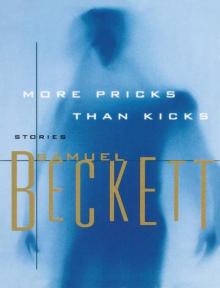 More Pricks Than Kicks
More Pricks Than Kicks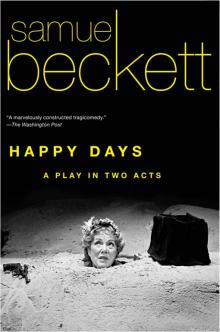 Happy Days
Happy Days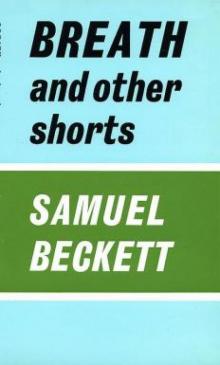 Breath, and Other Shorts
Breath, and Other Shorts Endgame & Act Without Words
Endgame & Act Without Words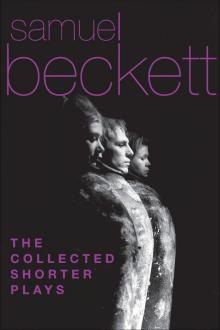 The Collected Shorter Plays of Samuel Beckett
The Collected Shorter Plays of Samuel Beckett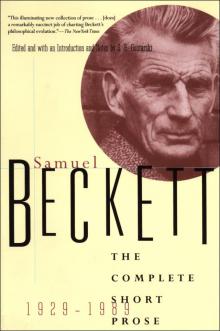 The Complete Short Prose, 1929-1989
The Complete Short Prose, 1929-1989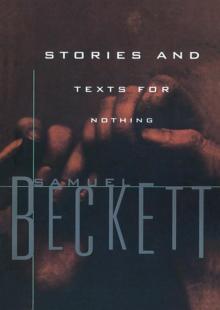 Stories and Texts for Nothing
Stories and Texts for Nothing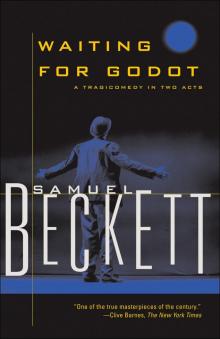 Waiting for Godot
Waiting for Godot Rockaby and Other Short Pieces
Rockaby and Other Short Pieces First Love and Other Shorts
First Love and Other Shorts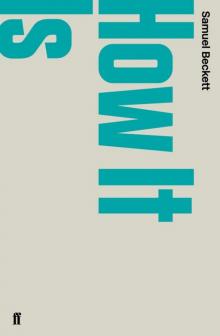 How It Is
How It Is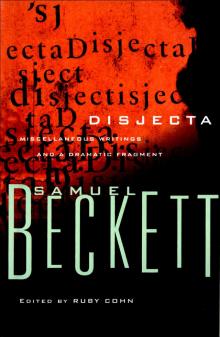 Disjecta: Miscellaneous Writings and a Dramatic Fragment
Disjecta: Miscellaneous Writings and a Dramatic Fragment Echo's Bones
Echo's Bones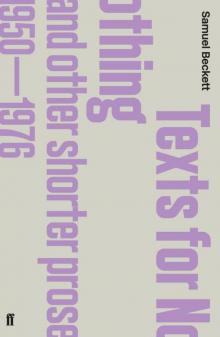 Texts for Nothing and Other Shorter Prose 1950-1976
Texts for Nothing and Other Shorter Prose 1950-1976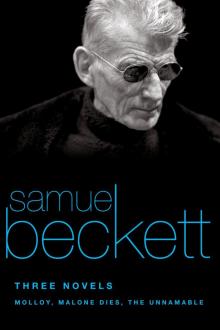 Three Novels
Three Novels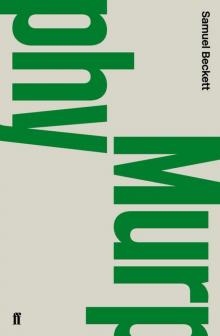 Murphy
Murphy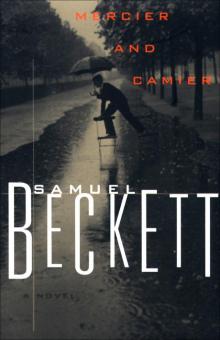 Mercier and Camier
Mercier and Camier Eleuthéria
Eleuthéria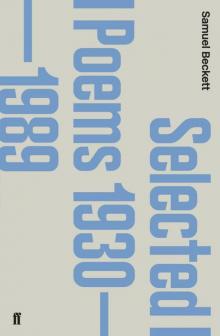 Selected Poems 1930-1988
Selected Poems 1930-1988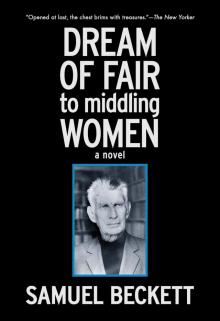 Dream of Fair to Middling Women
Dream of Fair to Middling Women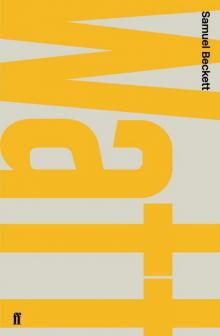 Watt
Watt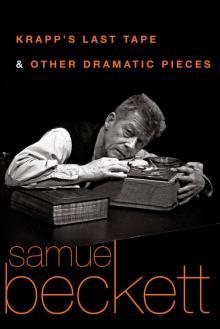 Krapp's Last Tape and Other Dramatic Pieces
Krapp's Last Tape and Other Dramatic Pieces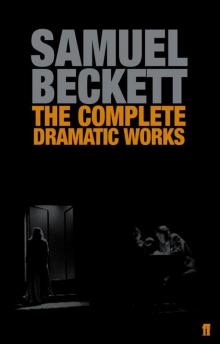 The Complete Dramatic Works of Samuel Beckett
The Complete Dramatic Works of Samuel Beckett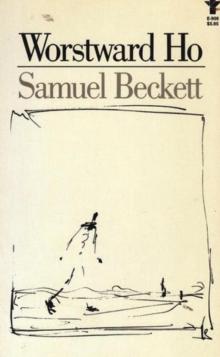 Worstward Ho
Worstward Ho Collected Poems in English and French
Collected Poems in English and French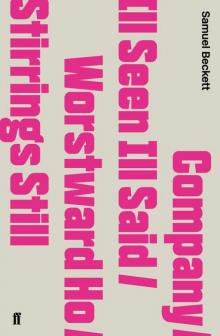 Company / Ill Seen Ill Said / Worstward Ho / Stirrings Still
Company / Ill Seen Ill Said / Worstward Ho / Stirrings Still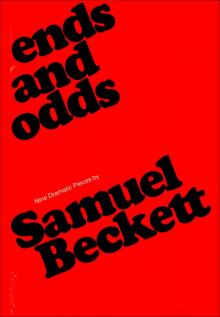 Ends and Odds
Ends and Odds Endgame Act Without Words I
Endgame Act Without Words I Rockabye and Other Short Pieces
Rockabye and Other Short Pieces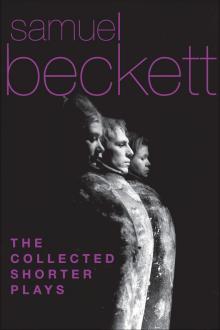 The Collected Shorter Plays
The Collected Shorter Plays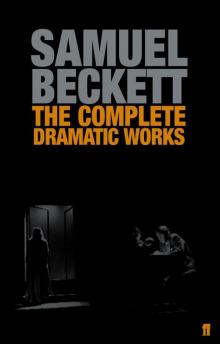 The Complete Dramatic Works
The Complete Dramatic Works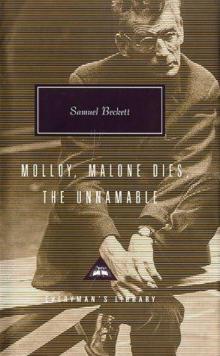 Three Novels: Malloy, Malone Dies, The Unnamable
Three Novels: Malloy, Malone Dies, The Unnamable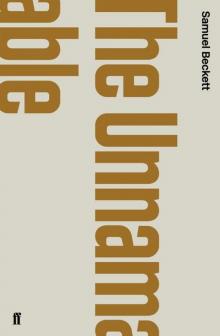 The Unnamable
The Unnamable